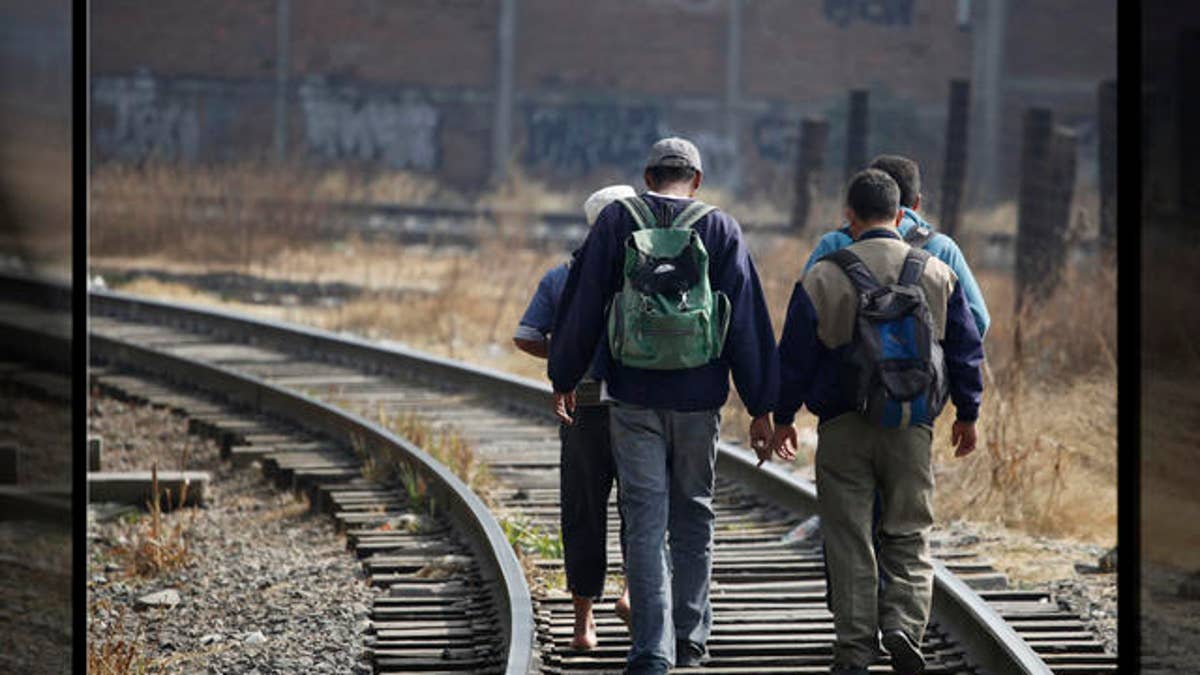
Central American migrants walk along the train tracks as they make their way north on the outskirts of Mexico City, Tuesday, Dec. 28, 2010. Gunmen kidnapped nine migrants in a southern Mexican state where other 50 migrants disappeared last week, El Salvador's Foreign Ministry announced Monday. Five of the migrants escaped to report the kidnapping, another was killed as he tried to flee and the other three remain missing, according to the Foreign Ministry. (AP Photo/Eduardo Verdugo)
The top human rights official for the United Nations says the December abduction of 40 Central American migrants in Mexico may have been facilitated to some degree by state government authorities, and is urging Mexico to investigate their possible involvement.
Mexico is the transit route for thousands of illegal migrants seeking to reach the United States, with many falling victim to gangs and organized crime.
U.N. rights chief Navi Pillay said some 40 migrants, mostly from El Salvador and Guatamela, were "abducted in highly questionable circumstances" on Dec. 16 from a freight train in the southern Mexican state of Oaxaca. Her office said Friday that the northbound freight train was stopped first "in a joint operation by police and migration officials" who detained 92 of the 250 migrants aboard.
"According to some accounts, military personnel were also involved," Pillay's office said, citing U.N. interviews with human rights groups. "A somewhat confused picture has emerged about what happened next."
According to the U.N., about 150 migrants got back on the train, run by a government-owned company. The driver then demanded money from the migrants but was not satisfied and told them there would be "more problems ahead."
A half-hour later, the train was reportedly boarded by gunmen who assaulted and robbed some of the migrants and abducted 40 of them, including at least 10 women and one child.
Two days later, some escaped and managed to reach a migrant shelter in Oaxaca run by Alejandro Solalinde, a well-known Roman Catholic priest and migrant rights activist who first reported the abductions.
"The Mexican authorities need to ascertain whether or not any state officials, including those working for the state-owned train operator, were complicit with the criminal organization that carried out the abductions and extortion, both in this and other cases," Pillay said.
Mexico condemns the kidnappings and is "fully committed to a thorough investigation" to determine whether any police or government officials were involved, its U.N. ambassador in Geneva, Juan Jose Gomez Camacho, said Friday.
"We will not stop until we do that," he said.
He said Mexico is also working with other countries to stop such attacks.
"We all need to do everything we can to ensure protection for innocent victims like migrants," he told The Associated Press. "This is not a phenomenon that is happening only in Mexico. They are being victimized by transnational organizations in the region."
He did not elaborate.
Pillay said she was concerned about death threats against Solalinde, who told Mexican authorities that witnesses told him the kidnappers have ties to the Zetas drug gang.
"The migrants were abducted in highly questionable circumstances a month ago," said Pillay, the U.N.'s high commissioner for human rights. "Since then, there has been no trace of them, and human rights defenders working with other members of the same group have been repeatedly threatened."
According to her office, Mexico's Interior Ministry gave humanitarian visas to migrants who witnessed the kidnapping and then took them to Mexico City for protection and more interviews.
Last week, Mexican federal prosecutors said five people were arrested in the kidnappings on information from 12 migrants who escaped. Mexican authorities initially had said there was no evidence the kidnapping had taken place.
There have been at least two other recent cases of kidnapped migrants in Mexico's Oaxaca and Veracruz states.
In the most horrific case to date, 72 migrants were found shot to death in the northeastern state of Tamaulipas in August in a massacre blamed on the Zetas drug gang.
This is based on a story by The Associated Press.
Follow us on twitter.com/foxnewslatino
Like us at facebook.com/foxnewslatino
